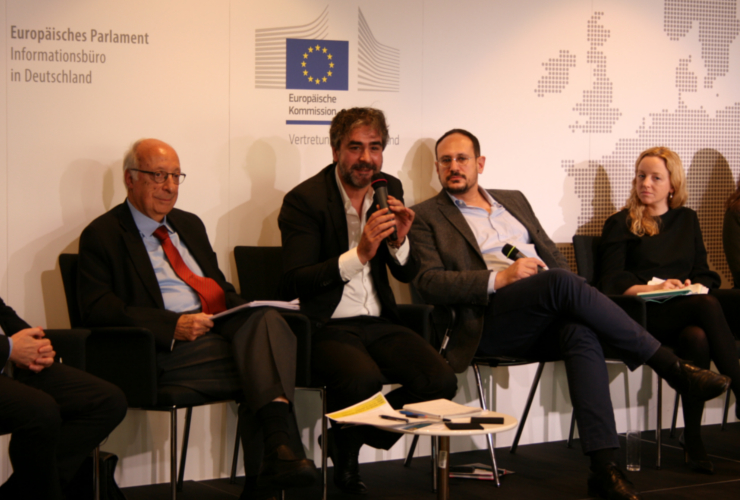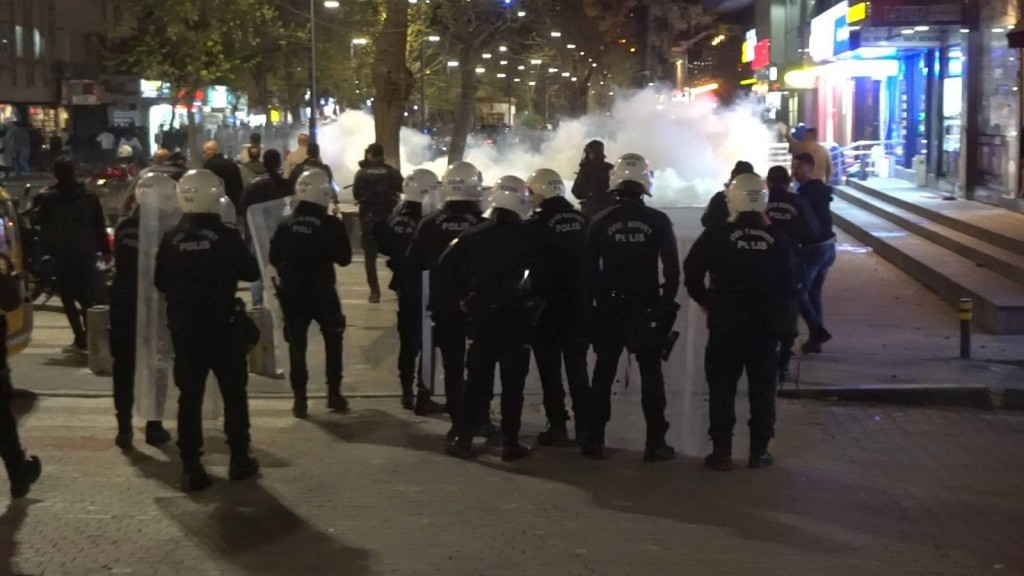Prominent Turkish journalists and lawyers last week urged Europe to take a stronger stance on fundamental rights in Turkey during a discussion panel organized by the International Press Institute (IPI) in partnership with the newspaper WELT in Berlin.
“The real question is how far Western European countries are willing to defend their values”, Rıza Türmen, a former Turkish judge at the European Court of Human Rights (ECtHR), stressed in his comments on the panel.
Türmen said that the ECtHR had thus far not used its entire toolbox to tackle fundamental rights problems in Turkey following the 2016 coup attempt.
“The court can play an effective role, but it has refrained from doing so”, Türmen, who left the ECtHR in 2008 after 10 years, said.
Kicking off panel 2 at our #Turkey #pressfreedom conference in Berlin on EU’s role in supporting rights in Turkey, with moderation by @DanielDBoehmer of @welt pic.twitter.com/yBGUQfxWa6
— IPI (@globalfreemedia) November 28, 2018
Türmen explained that the court has wrongly assumed in its recent decisions that Turkey’s judicial system is functioning and is independent from the government. For instance, instead of taking up the appeals of people dismissed from their position after the coup attempt, the ECtHR order Turkey to establish a special commission to investigate the cases, which has in turn fell under government influence.
The ECtHR generally requires parties to have exhausted all “domestic remedies” before appealing, which means it can take years for cases to reach Strasbourg. But Türmen said the court can waive this requirement in cases for states in which such remedies are ineffective or in which the rule of law no longer prevails. The court has not yet done so for Turkey despite the grave concerns over judicial independence in the country.
Recent ruling offers hope
Last month, however, the ECtHR issued a potentially pivotal new ruling, ordering Turkey to release jailed opposition politician Selahattin Demirtaş. The case marks the first time the court has found a violation of Article 18 of the European Convention on Human Rights with respect to Turkey. Article 18 forbids states from restricting rights and freedoms for purposes not outlined in the treaty. Specifically, the court found that Demirtaş’s detention during multiple election campaigns “pursued the predominant ulterior motive of stifling pluralism and limited freedom of political debate”.
Sarah Clarke, policy and advocacy manager at PEN International, called the ruling extremely important.
“This is a central issue which we have been pushing as hard as we can in the Council of Europe”, Clarke said of the ECtHR’s finding with regard to Article 18. “We’re still waiting on judgments on the other eight journalist cases so we believe the ECtHR should find violations of Article 18 in these cases.”
Troublingly, Turkey has so far refused to comply with the court’s decision as required by the Convention.
Türmen emphasized that it is now up to the other member states of the Council of Europe to ensure the court’s decision on Demirtaş is enforced.
“What happens after the judgement is dependent on (those) governments”, he said. “Europe could say to Turkey that it cannot be a member of the Council of Europe if things don’t change. The question is whether they will take action to enforce the decision or if they say it is business as usual.”
Only those in power benefit from inaction
In Turkey, over 160 journalists remain behind bars, making the country the world’s leading jailer of journalists. Journalists taking part in IPI’s conference in Berlin last week said they were disappointed with Europe’s efforts to act on violations of fundamental rights in Turkey.
Nevşin Mengü, a freelance journalist and former anchor at CNN Türk, criticized what she said were mixed messages coming from Europe. The previous week, EU High Representative for Foreign Affairs Federica Mogherini, and the EU’s commissioner on enlargement Johannes Hahn, said they had significant concerns over the large number of journalists and academics still being detained in Turkey.
Mengü though stressed that despite similar criticism over the past few years, there has not been a notable change in Europe’s attitude toward Turkey.
“Europe has to make up its mind. The current system is beneficial only to those in power. This good cop-bad cop thing is not working”, Mengü stressed.
Turkish-German journalist Deniz Yücel, a correspondent for WELT, said there had been a remarkable decrease in German interest in the situation in Turkey since he was released from a Turkish jail in February after a year in detention on propaganda charges.
“My case became a symbol in Germany. The German government took a stance against Turkey because the public pressure was so high”, Yücel said. “But after I was freed and the symbol was no longer there, Germany lost interest in press freedom in Turkey.”
Turkish-German journalist Deniz Yücel @Besser_Deniz: My case became a symbol in #Germany. But after I was freed and the symbol is no longer there, Germany lost interest in press freedom in Turkey.
At IPI’s #Turkey #pressfreedom conference in Berlin. pic.twitter.com/fTXWl6l8bA
— IPI (@globalfreemedia) November 28, 2018
Yücel said it appeared Germany had begun to accept the direction Turkey was headed.
“People are getting used to the idea that Turkey is becoming an Islamist Turkmenistan.”
Tora Pekin, a former lead lawyer in the cases against the secular newspaper Cumhuriyet, stressed that international organizations should ensure that violations of fundamental rights against Turkish journalists are reported and documented.
However, Pekin emphasized that the effects of the media crackdown are not limited to journalists in jail.
“Pressure on journalists does not start with court cases but (rather) much earlier”, he said. “We have a much larger number of journalists affected by the situation than only those in prison.”
Trial monitoring effective
Journalists and lawyers stressed that observation of journalists’ trials remains an essential tool in pushing for respect for the rule of law.
“Some of our colleagues were acquitted because there were international observers in the court”, Fatih Polat, editor-in-chief of independent newspaper Evrensel, said. “It was the international support that turned a domestic trial into an international issue.”
Does international solidarity on #Turkey work? Yes, says Evrensel editor @fpolat69 at IPI #Turkey #pressfreedom conference in Berlin. “We’ve been to trials where colleagues are acquitted because of presence of international observers.” #FreeTurkeyJournalists pic.twitter.com/yMge8cSU65
— IPI (@globalfreemedia) November 28, 2018
Tony Fisher, chair of the human rights committee at Law Society of England and Wales, expressed a similar view after having observed several court cases against Turkish and Kurdish lawyers.
“It brings comfort to those being tried but also puts pressure on the court”, he said. “The quality of rulings has improved by trial observation.”
Other proven measures, Fisher said, have been interventions and letters to U.N. special rapporteurs.
Panellists said that for those who are not able to attend court hearings, there are other ways to help journalists behind bars. Journalist Mehveş Evin, who works for Artı Gerçek and Yeni Yaşam, said that sending a book or a personal letter to an imprisoned colleague can be vital.
“When they know that people from outside, maybe from other country, are thinking about them, it makes their life in prison a little bit easier.”



